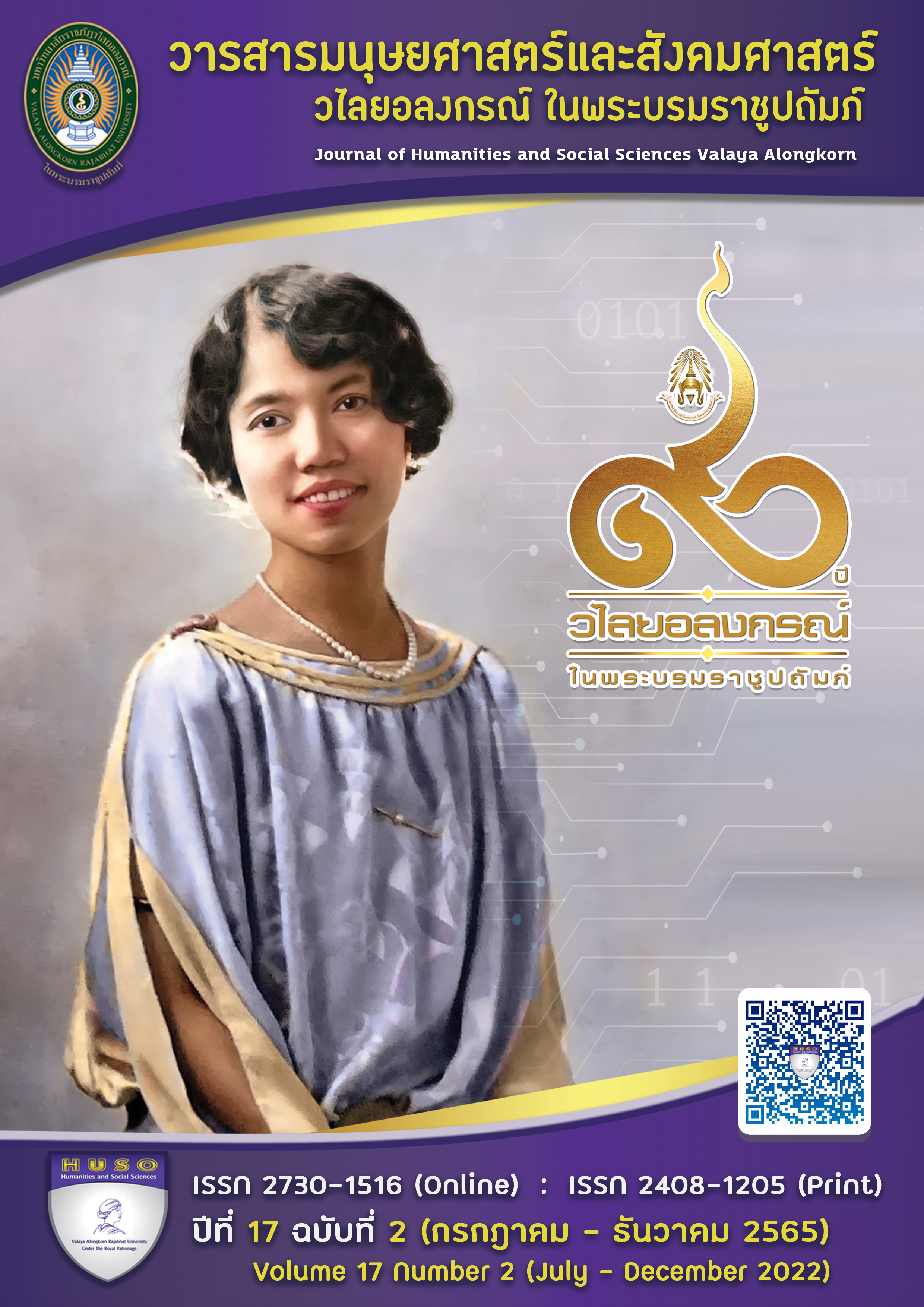EFFECTS OF PSYCHOLOGICAL CAPITAL AND FLOW EXPERIENCE IN LEARNING ON LEARNING BURNOUT OF UNDERGRADUATE STUDENTS, KASETSART UNIVERSITY
Main Article Content
Abstract
The aims of this study were to: 1) study the levels of psychological capital, flow experience in learning, and learning burnout of undergraduate students of Kasetsart University;2) investigate the relationship between their psychological capital, and learning burnout;
3) investigate the relationship between their flow experience in learning and learning burnout; and 4) study the effects of their psychological capital and flow experience in learning on the learning burnout. The research sample comprised 120 undergraduate students, Kasetsart University Bangkhen Campus who were studying in the second semester of the academic year 2021.
The sample was selected by multistage sampling. The instruments used in the research were:a personal information questionnaire, a psychological capital inventory, a flow experience in learning inventory, and a learning burnout inventory. The collected data were analyzed with statistical package programs using frequency, percentage, mean, standard deviation, Pearson correlation coefficient, and multiple regression analysis.
The research results showed that: 1) the psychological capital of students was at a rather high level (M = 3.60, SD = .63) while their flow experience in learning and learning burnout were at moderate levels (M = 3.18, SD = .49; M = 3.38, SD = .68 respectively); 2) psychological capital was negatively correlated with learning burnout at the significance level of .05 (r = -.519); 3) flow experience in learning was negatively correlated with learning burnout at the significance level of .05 (r = -.582); and 4) psychological capital and flow experience in learning could predict learning burnout at the significance level of .05, and both variables accounted for 36.20 percent of the total variance in overall learning burnout (R^2= .362).
Article Details

This work is licensed under a Creative Commons Attribution-NonCommercial-NoDerivatives 4.0 International License.
ลิขสิทธิ์บทความวิจัยที่ได้รับการตีพิมพ์เผยแพร่ในวารสารมนุษยศาสตร์และสังคมศาสตร์ วไลยอลงกรณ์ ในพระบรมราชูปถัมภ์ ถือเป็นกรรมสิทธิ์ของคณะมนุษยศาสตร์และสังคมศาสตร์ มหาวิทยาลัยราชภัฏวไลยอลงกรณ์ ในพระบรมราชูปถัมภ์ ห้ามนำข้อความทั้งหมดหรือบางส่วนไปพิมพ์ซ้ำ เว้นแต่จะได้รับอนุญาตจากมหาวิทยาลัยเป็นลายลักษณ์อักษร
ความรับผิดชอบ เนื้อหาต้นฉบับที่ปรากฏในวารสารมนุษยศาสตร์และสังคมศาสตร์ วไลยอลงกรณ์ ในพระบรมราชูปถัมภ์ เป็นความรับผิดชอบของผู้นิพนธ์บทความหรือผู้เขียนเอง ทั้งนี้ไม่รวมความผิดพลาดอันเกิดจากเทคนิคการพิมพ์
References
Bakker, A.B. & Woerkom, M.V. (2017). Flow at work: A self-determination perspective. Occupational Health Science. 1, 47–65. https://doi.org/10.1007/ s41542-017-0003-3.
(2022, 14 November).
Barratt, J.M., & Duran, F. (2021). Does psychological capital and social support impact engagement and burnout in online distance learning students. The Internet and Higher Education. 51. https://doi.org/10.1016/j.iheduc.2021.100821.
Csikszentmihalyi, M. (1975). Beyond Boredom and Anxiety: Experiencing Flow in Work and Play. Jossey Bass.
Csikszentmihalyi, M. (1990). Flow: The Psychology of Optimal Experience. https://www.researchgate.net/publication/224927532_Flow_ The_Psychology_of_Optimal_Experience. (2022, 14 November).
Csikszentmihalyi, M. (1997). Creativity: Flow and the psychology of discovery and invention.
HarperCollins.
Csikszentmihalyi, M. (2008). Flow: The Psychology of Optimal Experience. Harper
Perennial Modern Classics.
Csikszentmihalyi, M. & Csikszentmihalyi, I. (1988). Optimal Experience: Psychological Studies of Flow in Consciousness. https://books.google.co.th/books?hl=en&lr=&id=tdHL
CgAAQBAJ&oi=fnd&pg=PP1&dq=Optimal+Experience+:+Psychological+Studies+of+Flow+in+Consciousness&ots=EUbt53O3Ob&sig=6AsnWExkmxOTwcPM4a7vElQey0&redir_esc=y#v=onepage&q&f=false. (2022, 14 November).
Fares, J. et al. (2016). Extracurricular activities associated with stress and burnout in preclinical medical students. Journal of Epidemiology and Global Health. 6, 177– 185. https://doi.org/10.1016/j.jegh.2015.10.003. (2022, 14 November).
Faul, F. et al. (2007). G*Power 3: A flexible statistical power analysis program for the social, behavioral, and biomedical sciences. Behavior Research Method. 39(2), 175-191. [Online], Available: https://doi.org/10.3758/bf03193146. (2022, 14 November).
Ferreira, M., Cardoso, A.P. & Abrantes, J.L. (2011). Motivation and relationship of the student with the school as factors involved in the perceived learning. Procedia – Social and Behavioral Sciences. 29, 1707-1714. https://doi.org/10.1016/j.sbspro.2011.11.416. (2022, 14 November).
Im, H.J. & Lee, Y.L. (2021). A study of the relationship between learning flow and learning burnout in college online classes. Journal of Digital Convergence. 19(6), 39-46. [https://doi.org/10.14400/JDC.2021.19.6.039. (2022, 14 November).
Kintarak, S. (2018). Psychological capital: Background, components, and application.
Thai Journal of Clinical Psychology. 49(2), 56-69. [in Thai]
Luthans, F. et al. (2007). Positive psychological capital: Measurement and relationship with performance and satisfaction. Personnel Psychology. 60(3), 541 – 572. https://doi.org/10.1111/j.1744-6570.2007.00083.x. (2022, 14 November).
Luthans, F., Youssef, C.M. & Avolio, B.J. (2007). Psychological Capital: Developing the Human Competitive Edge. Oxford University Press.
Mootkhonkaen, C. (2019). The Study of Relationship between Psychological Capital and Study Burnout in Students of Science and Technology Majors in Naresuan University. Department of Psychology, Naresuan University.
Pongpisanrat, C. (2021). Learning burnout: An inevitable circumstance. Journal of Education, Mahasarakham University. 15(1), 8-16. [in Thai]
Prasath, P.R. et al. (2021). University student well-being during COVID-19: The role of psychological capital and coping strategies. The Professional Counselor. 11(1), 46-60. http://doi.org/10.15241/prp.11.1.46. (2022, 14 November).
Rad, M. et al. (2017). Psychological and academic burnout in students of clinical majors in Iran. Acta facultatis medicae Naissensis. 34(4), 311-319. http://doi.org/10.1515/afmnai-2017-0035. (2022, 14 November).
Rijavec, M. et al. (2017). Working part-time during studies: The role of flow in students’ well-being and academic achievement. Croatian Journal of Education. 19(3), 157-175. https://doi.org/10.15516/cje.v19i0.2724. (2022, 14 November).
Sanjamsai, S. (2019). Flow experience in learning among Thai university. Silpakorn Educational Research Journal. 11(2), 131-145. [in Thai]
Schaufeli, W.B., Salanova, M. & Bakker, A.B. (2002). The measurement of engagement and burnout: A two sample confirmatory factor analytic approach. Journal of Happiness Studies. 3, 71–92. https://doi.org/10.1023/A:1015630930326. (2022, 14 November).
Seligman, M.E.P. (2007). The optimistic child: A proven program to safeguard children against depression and build lifelong resilience. Houghton Mifflin Harcourt.
Taikerd, K. et al. (2019). Prevalence and associated factors of burnout syndrome in preclinical medical students, Thammasat University. Thammasat Medical Journal. 19, 127-138.
[in Thai]
Thairath. (2021). Department of Mental Health advises parents to let “children” take part
in the decision to get coronavirus vaccine.
https://www.thairath.co.th/news/local/2212332. (2022, 14 November). [in Thai]
Thungkaew, P. (2019). The effects of positive psychology capital enhancement program of students, Faculty of Education, Buriram Rajabhat University. Dhammathas Academic Journal. 21(4), 1-12. [in Thai]
Yingkeadtikun, B. & Anchaisri, A. (2022). Department of Mental Health revealed depression
and suicidal rate increase in lower age during COVID-19.
https://theactive.net/news/20220207-3/.(2022, 14 November). [in Thai]


